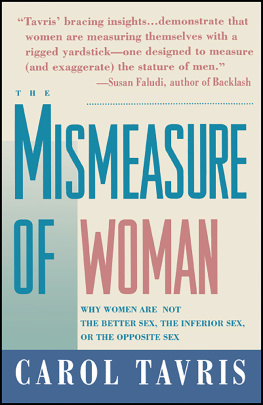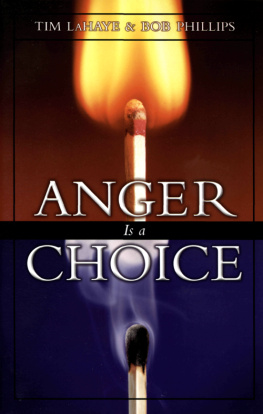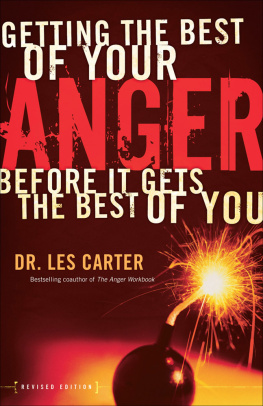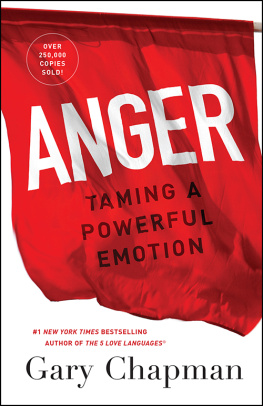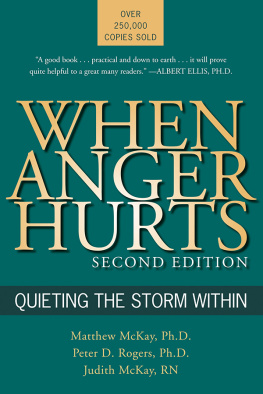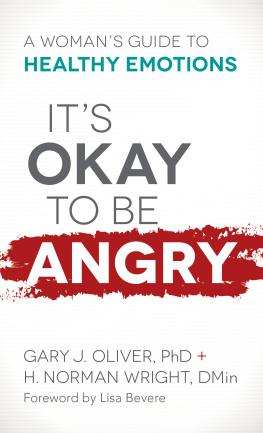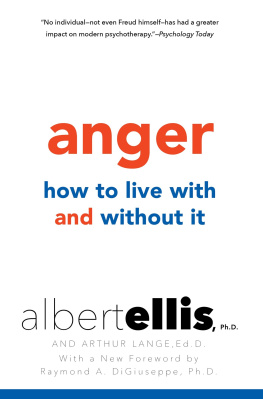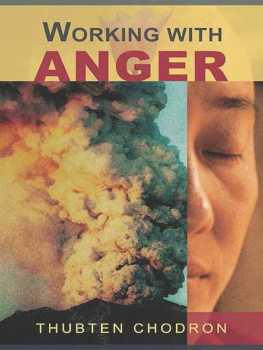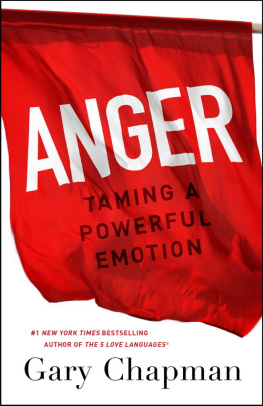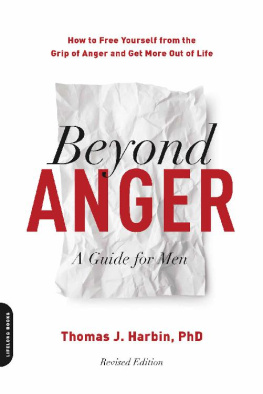
Touchstone
An Imprint of Simon & Schuster, Inc.
1230 Avenue of the Americas
New York, NY 10020
www.SimonandSchuster.com
Copyright 1982, 1989 by Carol Tavris
All rights reserved, including the right to reproduce this book or portions thereof in any form whatsoever. For information address Touchstone Subsidiary Rights Department, 1230 Avenue of the Americas, New York, NY 10020
First Touchstone ebook edition August 2017
TOUCHSTONE and colophon are registered trademarks of Simon & Schuster, Inc.
The Simon & Schuster Speakers Bureau can bring authors to your live event. For more information or to book an event contact the Simon & Schuster Speakers Bureau at 866-248-3049 or visit our website at www.simonspeakers.com.
ISBN 978-1-4391-4446-6 (eBook)
For Ronan OCasey
Anger is the emotion preeminently serviceable for the display of power .
W ALTER B. C ANNON
[Anger] is a management vehicle .
A LEXANDER H AIG
Contents
Preface to the Second Edition
It is a rare author who is given the chance for second thoughts about a book. But since this book was first published, several developments have occurred that made me want to get my hands back on it.
Although I was no stranger to anger the first time around, either in my personal life or in my experiences with the movement for womens rights over the last two decades, neither had I written this book to exorcise some personal angry demon. (I wrote it because I was angry, with a small a , at the destructive advice and commonplace notions about anger that I believe wreak much havoc in our society and our relationships.) Nevertheless, as it must to all of us, anger came home to roost on my doorstep. Two events in particular occurred to teach me viscerally what I had written about intellectuallythe unnecessarily destructive power of anger. One was a family rift: not the usual quarrels and grievances I was used tothose heal, and often make a funny story laterbut a real severing of connection, both physical and emotional. The other was a lawsuit, brought against my husband and me by a former friend who fell off a step in our house and broke her hip.
In both cases, anger itself was not the problem; anger is inevitable, as is conflict, between friends and loved ones. What was compelling to me about these sad events was the misery caused by the form of the anger expressed (in the family instance) and by the decision that anger was incompatible with friendship (in the friends instance). In both cases, I learned, anger served an ulterior goal: It was merely the excuse, providing the energy to carry out a decision that had already been made.
In the family quarrel, the reasons for the anger did not cause the rift. The reasons were trivial in the great scheme of things, and, as is often the case with great angers, no one can remember them now anyway. The rift was widened, however, because the four participants all spoke different anger languages, each with its own advantages and disadvantages. One of the four can be furiously, volcanically angry, which is intimidating to a calmer person, but he never says anything unfair or cruel; and then the tempest is over, done, forgotten. Another is more easygoing; he is rarely angry and has trouble expressing it when he is; his style is to accumulate his grievances, sometimes for years, and then spit them all in your face. The third is quick to express anger and moral outrage. When she is angry, she says anything that comes to mind, because she believes that anger is safe and empowering. For her, remarks said in the heat of anger dont count; youre supposed to forget them later.
My own style, as the fourth participant, is the one I liked least. I learned that I am slow to anger but, once angry, equally slow to forgive and forget. I take accusations and hard words literally, and brood over them. Tempests are over quickly; my storm clouds, once generated, hover for months.
Writer, heal thyself, I hear you saying; I have used the opportunity of revising and updating this book to do just that. My experiences have not changed my views of anger, based on the research I did the first time around. On the contrary, they have enriched and verified them, because now I understand how applicable this information is in what psychologists charmingly call real life.
I have also benefitted from talking with many people who labor in the anger trenchestherapists, teachers, parents, people living through the intense rage of divorce and disasterwho showed me how the research described in this book can be used. In lecturing and conducting workshops with all sorts of groups across the country, I was touched and impressed by the responses of these audiences. I heard from marriage and family counselors, who agreed that their problem is getting couples not to express anger, but to shut up long enough to listen to each other. I heard from people who run ventilationist therapies for violent adolescents, who told me that at last they understood why their programs werent working and why their patients were getting angrier and more violent. I heard from countless parents who were raising little hellions they disliked, but who were afraid to suppress their childrens aggressive instincts. I heard from couples who had settled into patterns of exasperating, debilitating quarrels, sniping, and meanness, and mistook this for honest communication of grievances. I heard from coaches and athletes, who told me encouraging stories of how temper control improves performance.
In the last few years, research on anger has blossomed. Most of it has confirmed and expanded the books arguments in many spheres of life, and I have added this new material where relevant. On the other hand, new evidence persuades me that the physiology of emotion is not so similar across all emotional states, as I wrote in the first edition, and I have changed Chapter 3 accordingly. Chapter 3 also contains a new essay on the growing tendency in psychology and law to excuse angry outbursts and violence thought to be caused by biological conditions such as postpartum depression, high testosterone levels, or drinking.
I have also learned more about the importance of confession (as opposed to catharsis): The conditions under which the revelation of emotional secrets (not necessarily anger itself) is important to health. Thus Chapter 5 contains a whole new conclusion, in which I draw together five conditions of catharsis under which the expression of anger is likely to be effective. (Unfortunately, these conditions are rarely met in real life!) Thus an important addition to Chapter 5 is the clarification of the circumstances under which the expression of anger can be beneficial, and those under which it can be hazardous.
I have added more on the increasing problem of highway anger (Chapter 6) and expanded the discussion of anger and violence in sports; fortunately, many coaches and athletes are beginning to understand the value of anger control for better performance (Chapter 6). The studies failing to support the prevalent belief of sex differences in anger pile up like autumn leaves, and I have included more of this confirming evidence in Chapter 7. I have added what I believe to be an important new approach to anger in the family, the family-systems model, to Chapter 8; this view strikes me as a brilliant alternative to the usual who started this, whos to blame spiral of unanswerable, unresolvable family arguments.
I thought long and hard about what to do with Chapter 9, which uses the womens movement as a case study in the rise and fall of anger as a force for social change. Some of my readers wanted me to add more about mens anger at women, and not focus quite so much on the womans perspective. However, my goal was not to delve into the fascinating and complex reasons that men and women are angry at each other, or to write up lists of what each gender objects to in the other. There are plenty of books that do that. I was trying to draw the readers attention to the larger question: how changing economic and demographic conditions, and changing social rolesfor men and women, for blacks and whites, for old and young, for gay and straighttear up peoples expectations of the right way to behave, and make them vulnerable to ideologies that direct their anger to the right sources to blame. The womens movement still makes an excellent illustration of these processes, so I decided to leave the original discussion virtually intact. I have, however, added a postscript on postfeminism, a look at what has happened to womens anger since the Reagan Revolution.
Next page
